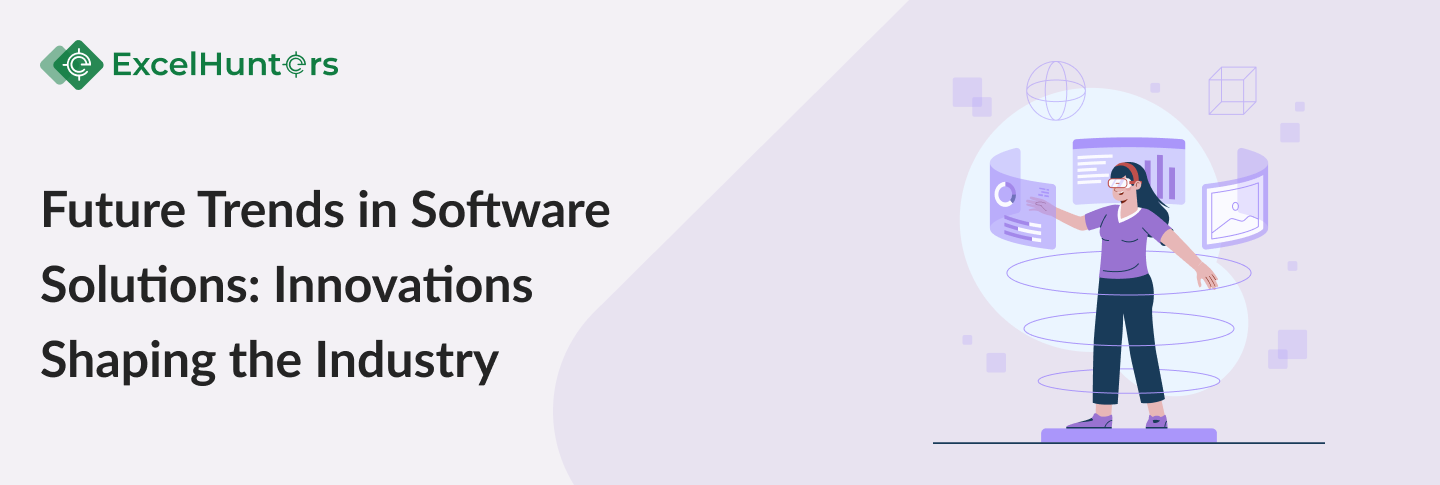Future Trends in Software Solutions: Innovations Shaping the Industry
Quick Summary
In today’s fast-paced digital landscape, the software industry continues to evolve at an unprecedented rate. From groundbreaking innovations in artificial intelligence to the widespread adoption of cloud computing, the future of software solutions is both exciting and promising. In this comprehensive guide, we’ll delve into the latest trends shaping the software industry and explore how these innovations are revolutionizing the way businesses operate.
The Rise of Artificial Intelligence (AI) and Machine Learning (ML)
One of the most significant trends shaping the future of software solutions is the rise of artificial intelligence and machine learning. AI and ML technologies are revolutionizing various industries by enabling computers to perform tasks that traditionally required human intelligence. From predictive analytics to natural language processing, AI-powered software solutions are becoming increasingly sophisticated, helping businesses streamline processes, improve decision-making, and enhance overall efficiency.
Natural Language Processing (NLP) and Conversational Interfaces
Natural language processing (NLP) is a branch of AI that focuses on enabling computers to understand, interpret, and generate human language. With the advent of NLP technologies, conversational interfaces such as chatbots and virtual assistants have become ubiquitous across various industries. These interfaces allow users to interact with software systems using natural language, making processes more intuitive and user-friendly.
Predictive Analytics and Data-driven Decision Making
Another area where AI and ML are making significant strides is in predictive analytics. By analyzing vast amounts of data, AI-powered algorithms can identify patterns, trends, and insights that human analysts might overlook. This enables businesses to make data-driven decisions, anticipate customer needs, and stay ahead of the competition in today’s rapidly changing market landscape.
The Emergence of Low-Code and No-Code Development Platforms
In recent years, there has been a growing trend towards low-code and no-code development platforms, which allow users to build and deploy software applications with minimal coding knowledge. These platforms provide intuitive drag-and-drop interfaces, pre-built templates, and visual development tools, enabling users to create custom applications quickly and cost-effectively.
Increased Accessibility and Empowerment
Low-code and no-code development platforms democratize software development by making it accessible to a broader range of users, including business analysts, designers, and non-technical professionals. This empowers organizations to innovate more rapidly, iterate on ideas faster, and bring new products and services to market more efficiently than ever before.
Accelerated Time-to-Market and Reduced Development Costs
By streamlining the software development process, low-code and no-code platforms enable organizations to accelerate time-to-market and reduce development costs significantly. With fewer resources required for coding and testing, businesses can allocate their resources more strategically, focusing on innovation and value creation rather than mundane development tasks.
The Evolution of Cloud Computing and SaaS Solutions
Cloud computing has emerged as a game-changer in the software industry, offering unparalleled scalability, flexibility, and cost-effectiveness. Software-as-a-Service (SaaS) solutions, in particular, have gained widespread adoption, enabling businesses to access powerful software applications on a subscription basis, without the need for costly infrastructure investments.
Scalability and Flexibility
One of the key advantages of cloud computing is its scalability and flexibility. Cloud-based software solutions can easily scale up or down to meet changing demand, allowing businesses to adapt quickly to evolving market conditions. This scalability also ensures that organizations can grow their operations without being limited by on-premises infrastructure constraints.
Cost-Effectiveness and Resource Optimization
Cloud computing offers significant cost savings compared to traditional on-premises infrastructure, eliminating the need for expensive hardware investments and ongoing maintenance costs. With pay-as-you-go pricing models, businesses only pay for the resources they use, enabling them to optimize their IT budgets and allocate resources more efficiently.
The Importance of Cybersecurity in Software Development

As software solutions become increasingly interconnected and reliant on cloud infrastructure, cybersecurity has emerged as a critical concern for businesses of all sizes. With cyber threats becoming more sophisticated and prevalent, organizations must prioritize security throughout the software development lifecycle. From implementing robust encryption protocols to conducting regular vulnerability assessments, investing in cybersecurity measures is essential to protect sensitive data and ensure the integrity of software systems.
Collaboration and Integration in Software Ecosystems
Another emerging trend in the software industry is the emphasis on collaboration and integration within software ecosystems. As businesses adopt an array of specialized software solutions to meet their diverse needs, the importance of seamless integration between different applications has become paramount. By leveraging APIs (Application Programming Interfaces) and interoperability standards, organizations can create interconnected software ecosystems that facilitate data exchange, streamline processes, and enhance overall efficiency. This collaborative approach not only improves productivity but also enables businesses to leverage the full potential of their software investments.
For any software solutions, don’t hesitate to contact Excelhunters to discuss your specific needs and requirements.
Conclusion
The future of software solutions is bright, with groundbreaking innovations shaping the industry in unprecedented ways. From artificial intelligence and machine learning to low-code development platforms and cloud computing, businesses have more tools and technologies at their disposal than ever before. By embracing these trends and staying ahead of the curve, organizations can unlock new opportunities, drive innovation, and achieve sustainable growth in today’s competitive marketplace.
Looking for
Consultations?Our Expertise
- 8 + years of experience
- Adept Developers
- Excel at Agile Development
- Cost-Effective


